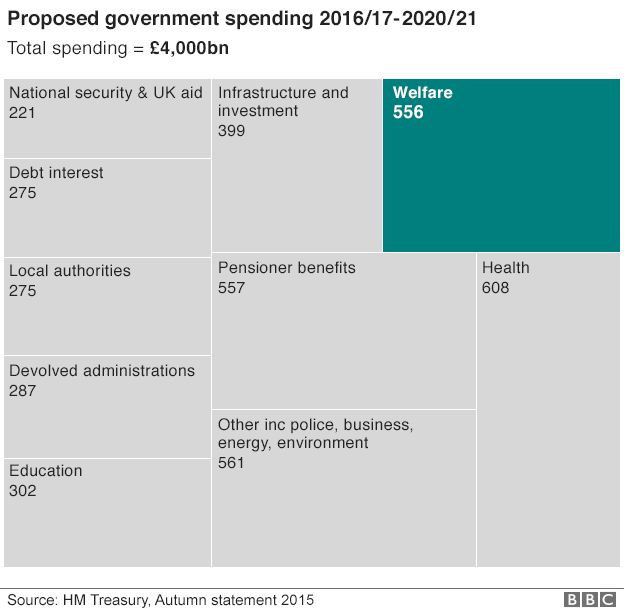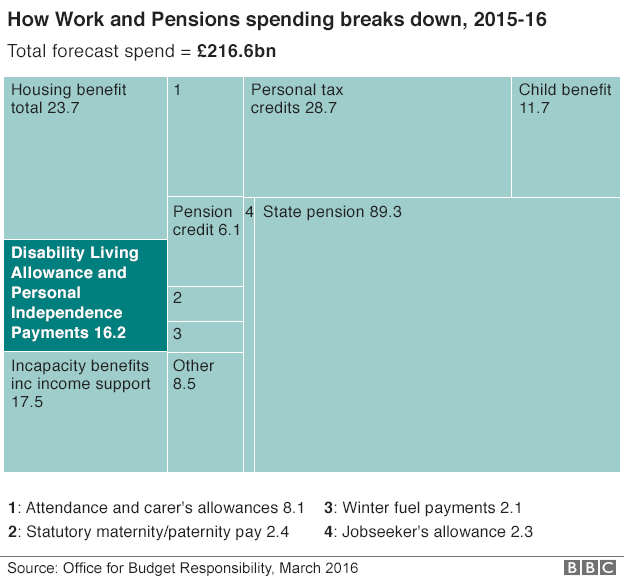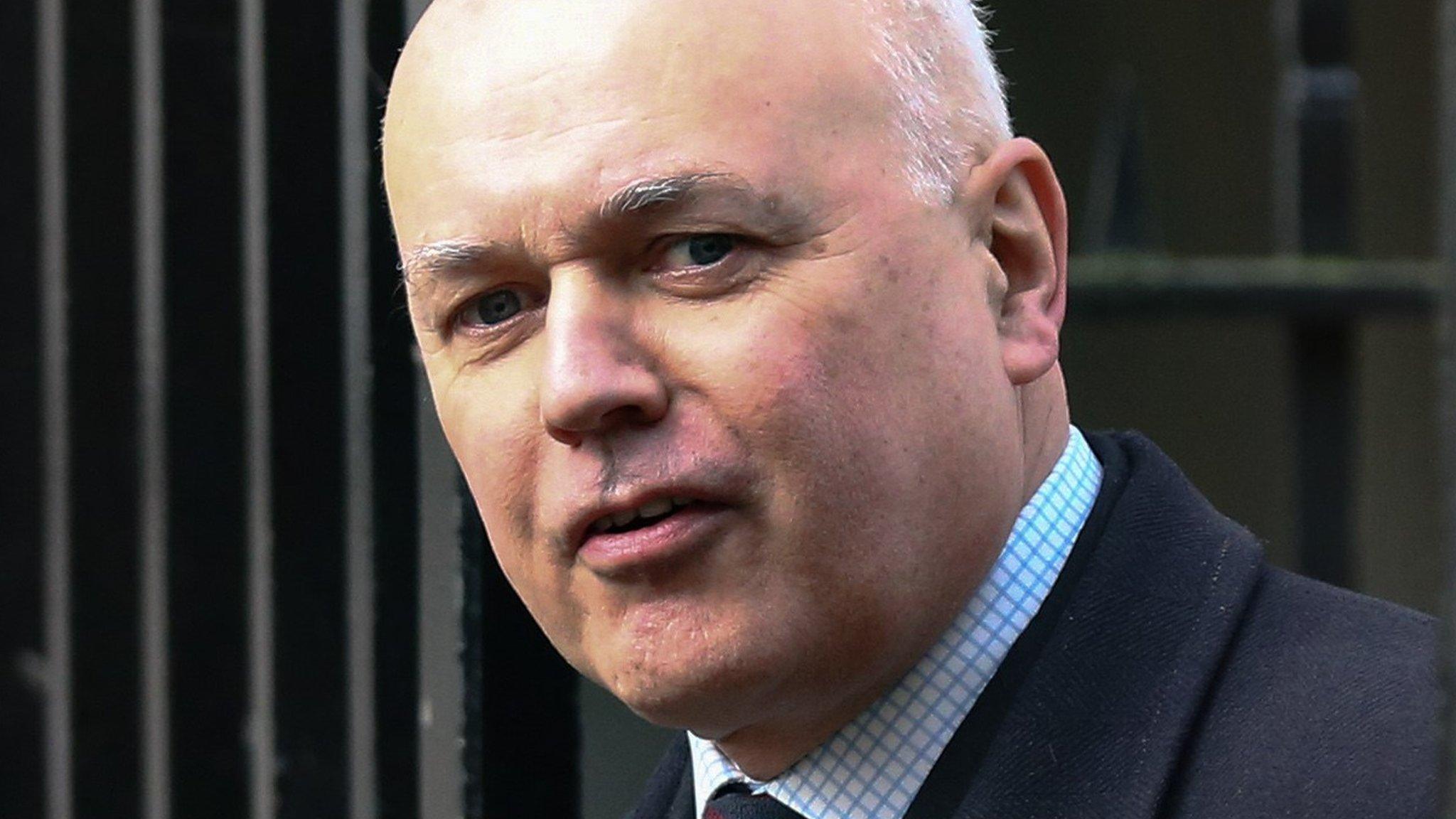Stephen Crabb: 'No further plans' for welfare cuts
- Published
- comments
Stephen Crabb: No further plans for welfare cuts
Ministers have said say they will not target other benefits to pay for abandoning cuts to disability payments.
Work and Pensions Secretary Stephen Crabb made the pledge in his first speech since replacing Iain Duncan Smith, who quit as discord broke out in the Tory party over the cuts.
Earlier, the PM defended Chancellor George Osborne, whose Budget is missing £4.4bn since the cuts were dropped.
Labour said Mr Osborne should resign and the Budget should be withdrawn.
Both David Cameron and Mr Crabb praised Mr Duncan Smith, who has said the government risked dividing society with politically-motivated spending cuts.
The new work and pensions secretary confirmed the changes to Personal Independence Payments had been cancelled and told MPs: "After discussing this issue over the weekend with the prime minister and the chancellor we have no further plans to make welfare savings beyond the very substantial savings legislated for by Parliament two weeks ago."
A Downing Street spokesman said the government would still deliver on its commitment to save £12bn from welfare by the end of the Parliament in 2020.
Mr Crabb also said the government welfare cap, branded "arbitrary" by Mr Duncan Smith, had "strengthened accountability" and its level would be reviewed in the Autumn Statement later this year.
"I am absolutely clear that a compassionate and fair welfare system should not be just about the numbers," he added.
"Behind every statistic there is a human being, and perhaps sometimes in government we forget that."

Analysis, BBC political editor Laura Kuenssberg
Stephen Crabb provided the usual Westminster wriggle room - no "planned" extra cuts - rather than ruling out taking the axe to the benefits budget ever, ever again.
But couple that with his comments in the Commons - "behind every statistic is a human being and perhaps sometimes in government we forget that" - and it seems the new secretary of state was displaying just as much sympathy with his predecessor's views as with the chancellor or the prime minister.
I'm told the plan to make that announcement was Mr Crabb's but the language was agreed by Downing Street and Number 11. The irony was perhaps that Iain Duncan Smith was nowhere to be seen in Westminster, absent for the announcement he might have longed to make himself.

The Conservative leadership has been under fire - including from some of its own backbenchers - over the cuts to disability payments, which came at the same time as tax cuts for higher earners.
Mr Duncan Smith - who resigned on Friday - said this flew in the face of Mr Cameron and Mr Osborne's oft-repeated claim that "we are all in this together".
London mayor Boris Johnson welcomed the fact that the cuts had been shelved but he said he rejected "totally and utterly" claims that the government was pursuing divisive policies.
Speaking to ITV's The Agenda, he said Mr Duncan Smith should have "stayed and fought his point of view" from within cabinet, saying his walkout was "a storm in a teacup".
'Enormous hole'
Mr Cameron addressed Mr Duncan Smith's attack during a statement about the European Council in the Commons on Monday afternoon.
He stressed to MPs that the Conservatives remained a "modern, compassionate, one nation" party under his leadership.
He listed policies aimed at low-earners including the National Living Wage and rebuilding "sink estates", adding: "None of this would be possible if it wasn't for the actions of this government and the work of the chancellor in turning our economy around."
Cameron: "We are a modern, compassionate, one-nation Conservative government"
Labour: 'Chaotic' Budget must be withdrawn
Bethan Thorpe has MS and said PIP was there to help people like her 'maintain their independence'
The changes to Personal Independence Payments which prompted his resignation have now been shelved, and ministers plan to say how the planned £4bn savings will be found at the Autumn Statement later in the year.
Responding to Mr Cameron's statement, Labour leader Jeremy Corbyn criticised Mr Osborne's absence from the Commons chamber and said the U-turn on disability benefits had created an "enormous hole" in the Budget, adding that the package had "inequality at its core".
He did not mention Mr Duncan Smith's resignation or his parting shot at the government.

When Labour MP Liz Kendall did put Mr Duncan Smith's criticism to the PM, Mr Cameron said he was sad at his colleague's resignation, adding: "But I can guarantee that work of being a compassionate Conservative government will continue."
The changes to the Budget were the subject of an urgent question from Labour before Mr Cameron's statement.
Shadow chancellor John McDonnell called on Mr Osborne to resign following Mr Duncan Smith's resignation and the furore over the PIP cuts, but Downing Street says the chancellor has the full confidence of the prime minister.
Mr McDonnell said Mr Osborne's absence from the Commons chamber "insults this House" and that Treasury Minister David Gauke had been left to "defend the indefensible".
He added: "This is no way to deliver a Budget and no way to manage an economy."

Mr Gauke said the chancellor would be in the chamber for Tuesday's Budget debate, and said Labour was not in a position to comment on "black holes" in budgets.
He said spending on Personal Independence Payments was up by £3bn since 2010, adding that the Budget "closes the gap between rich and poor and North and South".
As well as the welfare changes, Downing Street says ministers will not seek to oppose amendments to scrap the so-called "tampon tax" and an increase in VAT on solar panels.
- Published18 March 2016
